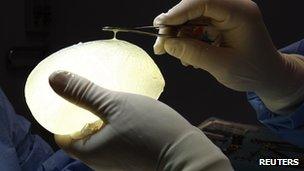Cosmetic surgery clinics call for tighter regulation
- Published

Two leading cosmetic surgery clinics say the PIP implant scandal was a result of regulatory failure
Two of the UK's leading private providers of cosmetic surgery are calling for improved regulation.
Harley Medical Group and Transform said European regulators' failures over breast implants manufactured by French company Poly Implant Prothese had caused financial and operating issues.
The UK's regulator had acted appropriately, but lessons should be learned, the Department of Health said.
The PIP implants had been filled with industrial silicon.
Spot checks in 2010 revealed the silicon had not been medical-grade.
Last December the French government announced it was advising all PIP patients to have their implants removed as a precaution and UK clinics were deluged with calls from worried women.
The Harley Medical Group in London had used nearly 14,000 PIP implants and initially offered free replacements, but it is now charging patients £2,500 because of spiralling costs.
Managing director Pierre Guillot told BBC Radio 4's The Report programme: "We have a duty of care to our patients and to date we have performed over 1,000 replacement surgeries, in the majority of cases at no cost to the patient."
However, Mr Guillot said the PIP implant scandal had taken his company from a "reasonable profit" to one that has made a loss for two consecutive years.
"We have operating and financial capacity issues," he added.
"We cannot finance the failures of the European regulatory system to have spotted a faulty implant for 12 consecutive years.
"You have to remember that these implants were CE marked. The CE marking means that the implants are not only safe but that the medical devices are efficacious."
Organisations across Europe award the mandatory CE marks to products in the European Economic Area (EEA).
Once a product has a CE mark in one EEA country, it can be exported to all the others - individual countries do not then make their own additional checks.
So, after a CE mark was awarded to PIP implants in Germany, the UK regulator along with others in Europe accepted them as safe to use - when in fact they had rupture rates twice to six times as high as others on the market.
Sir Bruce Keogh, head of the review: "There are some pretty grubby practices going on"
The EU is looking at tightening up the system of CE marks and enhancing co-operation between the different regulatory bodies in Europe.
Earlier this year, the final report into the PIP breast implants scandal concluded the gel material they contained did not pose a long-term threat to health.
The British government has now ordered a review of the cosmetic surgery industry, led by NHS medical director Sir Bruce Keogh.
He will examine whether there needs to be more regulation, how complaints are dealt with, and whether better clinical governance is needed.
But a report carried out by Lord Howe in May this year said there was no evidence the UK regulator, the Medicines and Healthcare Products Regulatory Agency (MHRA), had acted inappropriately or could have uncovered the fraud earlier.
The cosmetic surgery clinic Transform carried out some 5,000 PIP implant operations. Chief operating officer Pat Dunion told the BBC she would like the government to consider a compulsory register to record the details of all patients having breast implant operations.
"I'd be delighted if the MHRA would levy some sort of tax on implant manufacturers, and use that funding to come into facilities like Transform's, and other hospitals that provide cosmetic surgery, and take sample implants and check that they conform to the standards that they say they conform to," she said.
"I would welcome the government to start doing this now."
Sir Bruce is also considering a fund - like that offered by travel industry association Abta - that would pay out to patients in the event of anything going wrong.
Ms Dunion said: "It's a wonderful principle, but it would be difficult to see how such a scheme could be administered fairly - however, there might be different ways to do it.
"For example the government may levy some sort of charge on implant manufacturers and keep that fund set aside for some occurrence in the future."
Sir Bruce is expected to report back with the findings of his review in March 2013.
Hear more on this story on The Report on BBC Radio 4 on Thursday, 6 September 2012. You can listen again via the BBC Radio 4 website or The Report download.
- Published10 December 2013
- Published15 August 2012
- Published15 August 2012
- Published18 June 2012